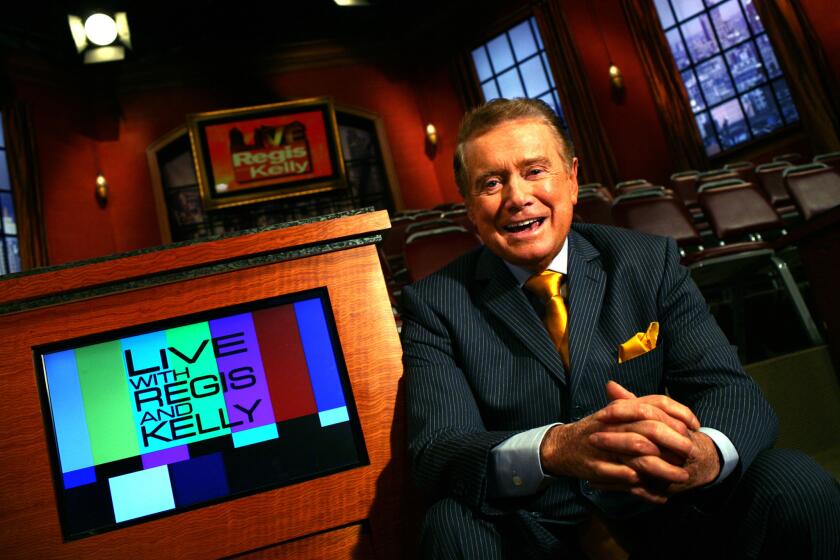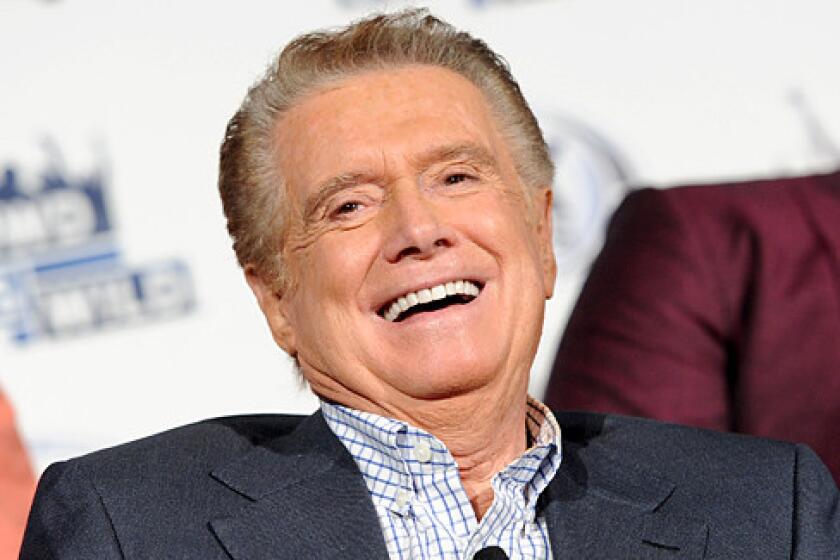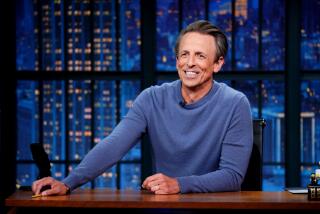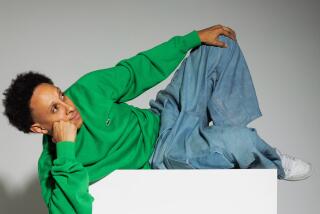Appreciation: Regis Philbin became TV’s greatest host by being himself. And America approved
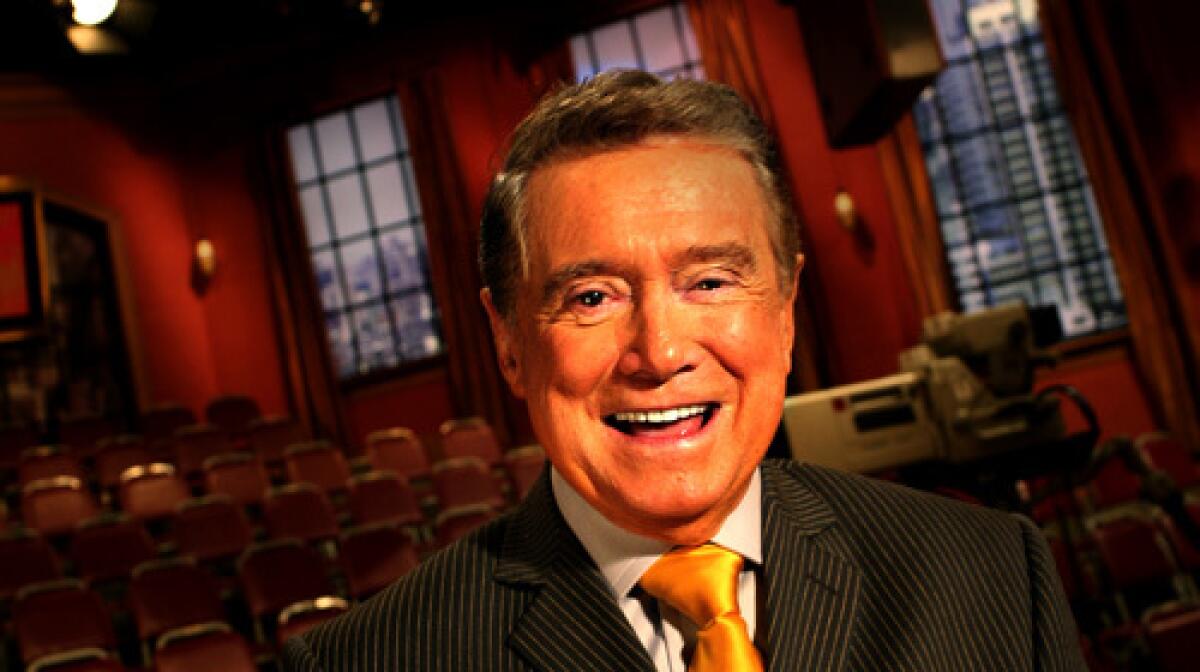
What is a host? A person to welcome you in, to make you comfortable, to show you around and tell you what you need to know. To introduce you to other people you might find interesting. To take any space and make it a home.
Regis Philbin, who died Friday, a month before his 89th birthday, was a host. Maybe the greatest of all hosts, if only for the number and variety of shows he hosted: talk shows, game shows, parades, pageants. As has been widely noted, he holds the Guinness World Record for most hours spent on television, a record that will likely stand until the end of television itself.
But he was great too for his capacity to enjoy people — contrasting his ongoing struggle with things, gadgets and gizmos — at least as they came before him on a television stage. (As to “people,” in the collective, he might wonder, “What the hell is wrong with them?”) He could work himself into a lather in an instant and an instant later be laughing at himself and everything. As his life in media transitioned from daily presence to delightful surprise, he was finally just Regis, a magnet for love.
Philbin in his early days was energetic, enthusiastic and personable. (Although he was a New Yorker to the core, he was for many years a West Coast broadcaster, including his first national notice as the sidekick on Joey Bishop’s late 1960s talk show, and also as the co-host for many years of “A.M. Los Angeles.”) But once he claimed a space and made it his, as he did with “Live! With Regis and Kathie Lee,” it was clear he could stick around until he decided to go. He could let his character fill the space, let his freak flag fly, as it were, within the bounds of old-school professionalism. His job was to be himself, which America agreed was a good thing, and that gave him room to grow even more cantankerous with age.
Morning after morning, Regis Philbin would help America brace itself for another workday with a contagious blend of enthusiasm, barbed humor and laments about the mundane ups and downs of everyday life — a visit from his mother-in-law, another tough loss for his bad-luck New York Mets, the wallet he accidentally left in a rental car.
There is a somnolent gentleness to the big network morning shows, as if they want to ease you out of slumber into the day, before your eyes are fully open. Philbin was something else again — energetic, extroverted, irritable, relishing tales of mishap. (He began the nationally syndicated version of “Live! With Regis and Kathie Lee” recounting the morning’s disasters — oversleeping, locking his keys in the car.) His success at that hour seems almost counterintuitive.
Although the symbolic paradigm of the “Live!”-style, co-hosted breakfast show is a married couple who know one another inside and out, that Philbin was married to someone else was made clear daily; that he had a wife named Joy, and much else about their relationship, seems almost common knowledge. But to a viewer, Philbin came across not so much as a husband or father but as a slightly eccentric uncle, charming, fun, comically irascible, bringing jokes, stories and maybe an interesting gift or acquaintance when he comes to visit. Overflowing with vitality, he was the person you’d look at and say, “I hope I’m that lively when I’m his age,” when in truth you aren’t now, won’t be and never were.
Philbin’s roots were Irish and Italian and Catholic, but growing up in the Bronx and his long association with comedians gave him a touch of the Borscht Belt. (He was never a comic himself, just funny, though there were notes of his pal Don Rickles in his spikier moments.) The resonant announcer’s voice, that mix of precise diction with an accent formed in the prewar streets of New York, mirrored the happy duality of his formal-casual, raw-cooked, big-little, celebrity-friend nature. He was not quite something out of “Guys and Dolls,” but he would have made a good Nathan Detroit, if anyone had asked. (He could have carried the tunes too.)
‘People who never met him feel as though they’ve lost a personal friend,’ New York Mayor Bill de Blasio tweeted.
So extensive are his credits that merely to read them is exhausting. That his career flowered from a bed of early failures suggests that the problem was less Philbin’s than television’s, and the arrival of the right vehicle. He was in his mid-50s — not that you could tell — when in 1985 he first paired with Kathie Lee Gifford, then Johnson, on the New York-based “The Morning Show,” which became the juggernaut known as “Live! With Regis and Kathie Lee” in 1988. Gifford left in 2000, eventually to be replaced by Kelly Ripa, who now cohosts with Ryan Seacrest, to continuing success.
That he had a long history in local television gave his national shows something of their hometown homeliness: Regis’ Big Apple was yours for the taking.
“You were a man about town,” Larry King said to him in a 2017 interview on “Larry King Now.” “You went to the theater...”
“I had to do all that,” Philbin replied, “because I wanted to tell everybody what I saw last night, as it came out.”
It’s not too much to say that Philbin’s years on “Live!” comprise a kind of incidental diary of New York City life, or a certain segment of it in the late 20th and early 21st century. Where many TV hosts have been famously private about their off-camera lives, Philbin was always forthcoming. Perhaps this has something to do with his greatest success being as a daytime host, working alongside women. (“The Talk” and “The View,” both of which had him as a guest, are temperamental kin.) Philbin was a sharer — even an oversharer when it came to various medical procedures he’d had to undergo. He felt knowable.
Indeed, the sheer number of TV series and films in which he appears as himself — including, but not limited to, “The Larry Sanders Show,” “Mad About You,” “All My Children,” “Seinfeld,” “The Fresh Prince of Bel-Air,” “The Simpsons,” “Caroline in the City,” “Spin City,” “How I Met Your Mother,” “Damages,” “Ugly Betty,” “30 Rock” and “Fresh Off the Boat” on the smaller screen and “Night and the City,” “Cheaper by the Dozen” and “The Breakup Artist” on the bigger — attests to his cultural eminence. There were also, from early on, more or less straight acting parts in “Get Smart,” “That Girl,” “Love, American Style,” “Fantasy Island,” “Hot in Cleveland” and the soap opera “Ryan’s Hope,” where he acquits himself well enough to suggest that he might have had a career reading other people’s words instead of speaking off the top of his head.
And, of course, there was “Who Wants to Be a Millionaire,” which he hosted in its original and some subsequent iterations, the first season of “America’s Got Talent,” “Million Dollar Password” and so forth and so on.
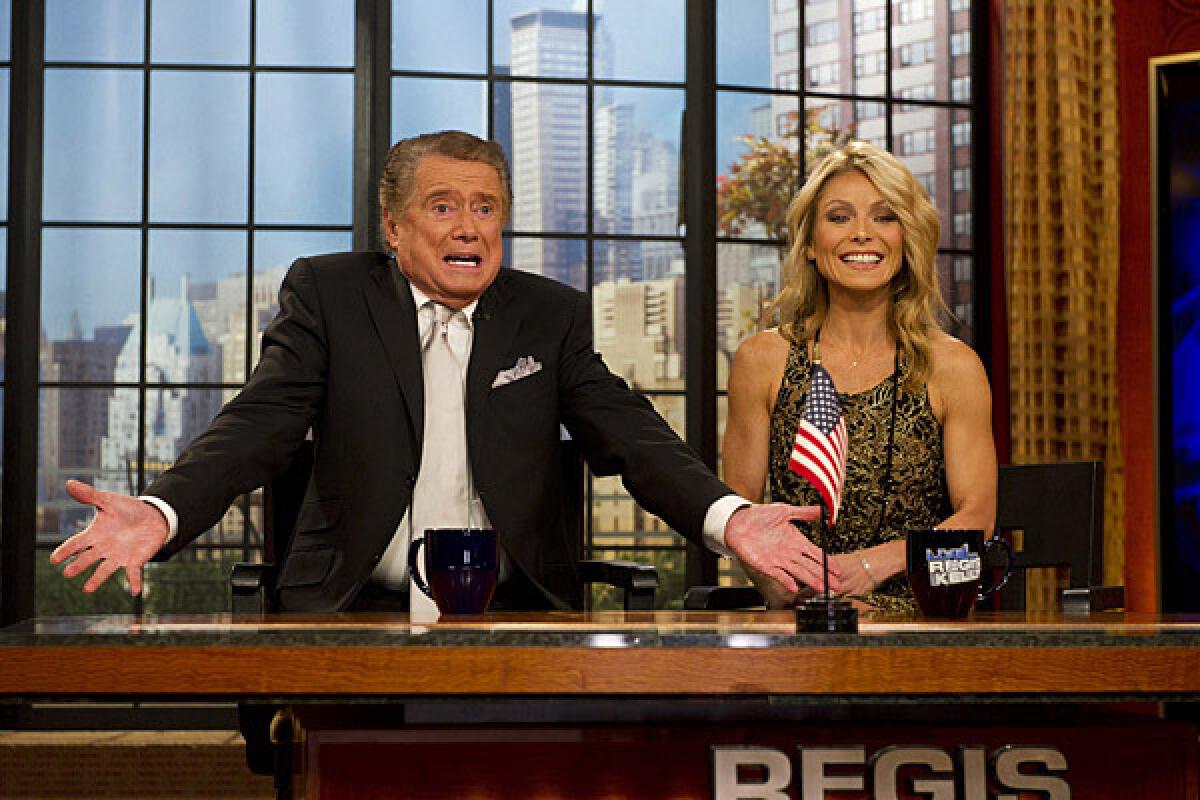
Philbin left “Live!” in 2011, but it was not nearly the end of his presence on television. There were other, briefer hosting gigs, and guest-hosting gigs and guest appearances; he had a rambunctious chemistry with “The Late Late Show” host Craig Ferguson, who would introduce him as “one of the most delightful-smelling entertainers you will ever inhale.” He was also a frequent, mocked and mocking presence on the “Late Show With David Letterman,” though in a more serious mood, he was a guest on Letterman’s first show after 9/11. On his final “Late Show” appearance in 2015 (“You’re leaving! So where does that leave Regis?”), the host noted that Philbin had been on the show more than 150 times, the most of any guest. He exited through the theater, as the band played “Sabre Dance,” shaking hands. “Go ahead and take your time, Regis,” said the host.
Even as a guest on someone else’s show, Philbin’s innate hostliness would come out. He would walk out to waves of adoring applause, and not head straight to the chair, but take a few steps toward the crowd, to acknowledge and bathe in their appreciation, as if it were in some portion his show — which, for the moment, it was. Once seated, he would take to addressing the camera directly, leaning forward from the edge of his chair, hands and arms working mightily as he worked himself up into a Philbean lather. In very late life, he might require a little more partnering and prompting — names escaped him, as they will you — but wherever he went, it was always his show.
His last television appearance was a cameo this year on ABC’s “Single Parents,” a situation comedy co-created by his daughter, J.J. Philbin. It is a perfectly constructed Regis moment, following him at a fast clip through the halls of a hospital as he wrestles with a cellphone, trying to get a signal, purportedly on the line with his old “Live! With” producer, Michael Gelman. “Gelman, can you hear me? Gelman, I’ve only got one bar. What the hell is wrong with this?”
He stuck the landing.
More to Read
The complete guide to home viewing
Get Screen Gab for everything about the TV shows and streaming movies everyone’s talking about.
You may occasionally receive promotional content from the Los Angeles Times.
